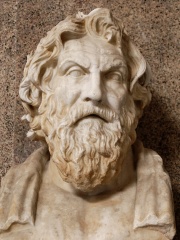
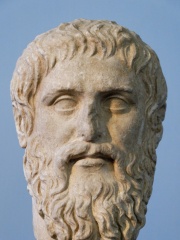
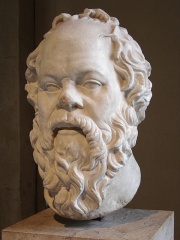
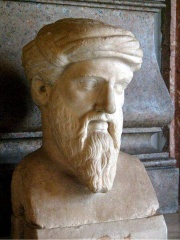


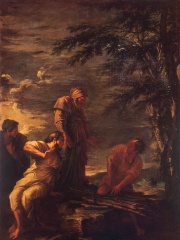
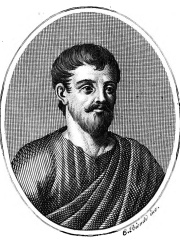
The Most Famous
PHILOSOPHERS from Greece
This page contains a list of the greatest Greek Philosophers. The pantheon dataset contains 1,267 Philosophers, 66 of which were born in Greece. This makes Greece the birth place of the 6th most number of Philosophers behind United States, and Italy.
Top 10
The following people are considered by Pantheon to be the top 10 most legendary Greek Philosophers of all time. This list of famous Greek Philosophers is sorted by HPI (Historical Popularity Index), a metric that aggregates information on a biography's online popularity. Visit the rankings page to view the entire list of Greek Philosophers.

1. Aristotle (384 BC - 321 BC)
With an HPI of 96.25, Aristotle is the most famous Greek Philosopher. His biography has been translated into 223 different languages on wikipedia.
Aristotle (Attic Greek: Ἀριστοτέλης, romanized: Aristotélēs; 384–322 BC) was an ancient Greek philosopher and polymath. His writings cover a broad range of subjects spanning the natural sciences, philosophy, linguistics, economics, politics, psychology, and the arts. As the founder of the Peripatetic school of philosophy in the Lyceum in Athens, he began the wider Aristotelian tradition that followed, which set the groundwork for the development of modern science. Little is known about Aristotle's life. He was born in the city of Stagira in northern Greece during the Classical period. His father, Nicomachus, died when Aristotle was a child, and he was brought up by a guardian. At around eighteen years old, he joined Plato's Academy in Athens and remained there until the age of thirty seven (c. 347 BC). Shortly after Plato died, Aristotle left Athens and, at the request of Philip II of Macedon, tutored his son Alexander the Great beginning in 343 BC. He established a library in the Lyceum, which helped him to produce many of his hundreds of books on papyrus scrolls. Though Aristotle wrote many treatises and dialogues for publication, only around a third of his original output has survived, none of it intended for publication. Aristotle provided a complex synthesis of the various philosophies existing prior to him. His teachings and methods of inquiry have had a significant impact across the world, and remain a subject of contemporary philosophical discussion. Aristotle's views profoundly shaped medieval scholarship. The influence of his physical science extended from late antiquity and the Early Middle Ages into the Renaissance, and was not replaced systematically until the Enlightenment and theories such as classical mechanics were developed. He influenced Judeo-Islamic philosophies during the Middle Ages, as well as Christian theology, especially the Neoplatonism of the Early Church and the scholastic tradition of the Catholic Church. Aristotle was revered among medieval Muslim scholars as "The First Teacher", and among medieval Christians like Thomas Aquinas as simply "The Philosopher", while the poet Dante called him "the master of those who know". He has been referred to as the first scientist. His works contain the earliest known systematic study of logic, and were studied by medieval scholars such as Peter Abelard and Jean Buridan. His influence on logic continued well into the 19th century. In addition, his ethics, although always influential, has gained renewed interest with the modern advent of virtue ethics.

2. Plato (427 BC - 347 BC)
With an HPI of 95.94, Plato is the 2nd most famous Greek Philosopher. His biography has been translated into 217 different languages.
Plato ( PLAY-toe; Greek: Πλάτων, Plátōn; born c. 428–423 BC, died 348/347 BC) was an ancient Greek philosopher of Classical Athens who is most commonly considered the foundational thinker of the Western philosophical tradition. An innovator of the literary dialogue and dialectic forms, Plato influenced all the major areas of theoretical philosophy and practical philosophy, and was the founder of the Platonic Academy, a philosophical school in Athens where Plato taught the collection of philosophical theories that would later become known as Platonism. Plato's most famous contribution is his Theory of Forms (or Ideas), which aims to solve what is now known as the problem of universals. He was influenced by the pre-Socratic thinkers Pythagoras, Heraclitus, and Parmenides, although much of what is known about them is derived from Plato himself. Along with his teacher Socrates, and his student Aristotle, Plato is a central figure in the history of Western philosophy. Plato's complete works are believed to have survived for over 2,400 years—unlike that of nearly all of his contemporaries. Although their popularity has fluctuated, they have consistently been read and studied through the ages. Through Platonism's outgrowth Neoplatonism, he also influenced Christian philosophy, and both Jewish and Islamic philosophy. In modern times, Alfred North Whitehead said: "the safest general characterization of the European philosophical tradition is that it consists of a series of footnotes to Plato."

3. Socrates (470 BC - 399 BC)
With an HPI of 94.90, Socrates is the 3rd most famous Greek Philosopher. His biography has been translated into 201 different languages.
Socrates (; Ancient Greek: Σωκράτης, romanized: Sōkrátēs; c. 470 – 399 BC) was an ancient Greek philosopher from Classical Athens, perhaps the first Western moral philosopher, and a major inspiration on his student Plato, who largely founded the tradition of Western philosophy. An enigmatic figure, Socrates authored no texts and is known mainly through the posthumous accounts of classical writers, particularly his students Plato and Xenophon. These accounts are written as dialogues, in which Socrates and his interlocutors examine a subject in the style of question and answer; they gave rise to the Socratic dialogue literary genre. Contradictory accounts of Socrates make a reconstruction of his philosophy nearly impossible, a situation known as the Socratic problem. Socrates was a polarizing figure in Athenian society. In 399 BC, he was accused of impiety and corrupting the youth. After a trial that lasted a day, he was sentenced to death. As related by Plato, he was put to death by administration of poison after refusing offers from allies to help him escape. Plato's dialogues are among the most comprehensive accounts of Socrates to survive from antiquity. They demonstrate the Socratic approach to areas of philosophy including epistemology and ethics. The Platonic Socrates lends his name to the concept of the Socratic method, and also to Socratic irony. The Socratic method of questioning, or elenchus, takes shape in dialogue using short questions and answers, epitomized by those Platonic texts in which Socrates and his interlocutors examine various aspects of an issue or an abstract meaning, usually relating to one of the virtues, and find themselves at an impasse, unable to define what they thought they understood. Socrates frequently proclaims his ignorance, saying that he is only sure that he does not know. Socrates exerted a strong influence on philosophers in later antiquity and has continued to do so in the modern era. He was studied by medieval and Islamic scholars and played an important role in the thought of the Italian Renaissance, particularly within the humanist movement. Interest in him continued unabated, as reflected in the works of Søren Kierkegaard and Friedrich Nietzsche. Depictions of Socrates in art, literature, and popular culture have made him a widely known figure in the Western philosophical tradition.

4. Pythagoras (570 BC - 495 BC)
With an HPI of 93.36, Pythagoras is the 4th most famous Greek Philosopher. His biography has been translated into 158 different languages.
Pythagoras of Samos (Ancient Greek: Πυθαγόρας; c. 570 – c. 495 BC) was an ancient Ionian Greek philosopher, polymath, and the eponymous founder of Pythagoreanism. His political and religious teachings were well known in Magna Graecia and influenced the philosophies of Plato, Aristotle, and, through them, Western philosophy. Modern scholars disagree regarding Pythagoras's education and influences, but most agree that he travelled to Croton in southern Italy around 530 BC, where he founded a school in which initiates were allegedly sworn to secrecy and lived a communal, ascetic lifestyle. In antiquity, Pythagoras was credited with mathematical and scientific discoveries, such as the Pythagorean theorem, Pythagorean tuning, the five regular solids, the theory of proportions, the sphericity of the Earth, the identity of the morning and evening stars as the planet Venus, and the division of the globe into five climatic zones. He was reputedly the first man to call himself a philosopher ("lover of wisdom"). Historians debate whether Pythagoras made these discoveries and pronouncements, as some of the accomplishments credited to him likely originated earlier or were made by his colleagues or successors, such as Hippasus and Philolaus. The teaching most securely identified with Pythagoras is the "transmigration of souls" or metempsychosis, which holds that every soul is immortal and, upon death, enters into a new body. He may have also devised the doctrine of musica universalis, which holds that the planets move according to mathematical ratios and thus resonate to produce an inaudible symphony of music. Following Croton's decisive victory over Sybaris in around 510 BC, Pythagoras's followers came into conflict with supporters of democracy, and their meeting houses were burned. Pythagoras may have been killed during this persecution, or he may have escaped to Metapontum and died there. Pythagoras influenced Plato whose dialogues (especially Timaeus) exhibit Pythagorean ideas. A major revival of his teachings occurred in the first century BC among Middle Platonists, coinciding with the rise of Neopythagoreanism. Pythagoras continued to be regarded as a great philosopher throughout the Middle Ages and Pythagoreanism had an influence on scientists such as Nicolaus Copernicus, Johannes Kepler, and Isaac Newton. Pythagorean symbolism was also used throughout early modern European esotericism, and his teachings as portrayed in Ovid's Metamorphoses would later influence the modern vegetarian movement.
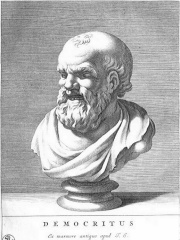
5. Democritus (460 BC - 360 BC)
With an HPI of 86.85, Democritus is the 5th most famous Greek Philosopher. His biography has been translated into 102 different languages.
Democritus (, dim-OCK-rit-əs; Greek: Δημόκριτος, Dēmókritos, meaning "chosen of the people"; c. 460 – c. 370 BC) was an Ancient Greek pre-Socratic philosopher from Abdera, primarily remembered today for his formulation of an atomic theory of the universe. Democritus wrote extensively on a wide variety of topics. None of Democritus' original work has survived, except through second-hand references. Many of these references come from Aristotle, who viewed him as an important rival in the field of natural philosophy. He was known in antiquity as the ‘laughing philosopher’ because of his emphasis on the value of cheerfulness.

6. Epicurus (341 BC - 269 BC)
With an HPI of 86.65, Epicurus is the 6th most famous Greek Philosopher. His biography has been translated into 95 different languages.
Epicurus (, EH-pih-KURE-əs; Ancient Greek: Ἐπίκουρος Epikouros; 341–270 BC) was an ancient Greek philosopher who founded Epicureanism, a highly influential school of philosophy; it asserted that philosophy's purpose is to attain as well as to help others attain tranquil lives, characterized by freedom from fear and the absence of pain. Epicurus advocated that people were best able to pursue philosophy by living a self-sufficient life surrounded by friends; he and his followers were known for eating simple meals and discussing a wide range of philosophical subjects at "The Garden", the school he established in Athens. Epicurus taught that although the gods exist, they have no involvement in human affairs. Like the earlier philosopher Democritus, Epicurus claimed that all occurrences in the natural world are ultimately the result of tiny, invisible particles known as atoms moving and interacting in empty space, though Epicurus also deviated from Democritus by proposing the idea of atomic "swerve", which holds that atoms may deviate from their expected course, thus permitting humans to possess free will in an otherwise deterministic universe. Of the over 300 works said to have been written by Epicurus about various subjects, the vast majority have been lost. Only a few letters and a collection of quotes—the Principal Doctrines—have survived intact, along with several fragments of his other writings, such as his major work On Nature; most knowledge about his philosophy is due to later authors. Epicureanism reached the height of its popularity during the late years of the Roman Republic, but by late antiquity, it had died out. Throughout the Middle Ages, Epicurus was popularly, though inaccurately, remembered as a patron of drunkards, whoremongers, and gluttons. His teachings gradually became more widely known in the fifteenth century with the rediscovery of important texts, but his ideas did not become acceptable until the seventeenth century, when the French Catholic priest Pierre Gassendi revived a modified version of them, which was promoted by other writers, including Walter Charleton and Robert Boyle. His influence grew considerably during and after the Enlightenment, impacting the ideas of major thinkers, including John Locke and Karl Marx.

7. Plutarch (46 - 127)
With an HPI of 83.51, Plutarch is the 7th most famous Greek Philosopher. His biography has been translated into 99 different languages.
Plutarch (; Ancient Greek: Πλούταρχος, Ploútarchos, Koine Greek: [ˈplúːtarkʰos]; before AD 50 – after 120) was a Greek and later Roman Middle Platonist philosopher, historian, biographer, essayist, and priest at the Temple of Apollo in Delphi. He is known primarily for his Parallel Lives, a series of biographies of illustrious Greeks and Romans, and Moralia, a collection of essays and speeches. Upon becoming a Roman citizen, he was possibly named Lucius Mestrius Plutarchus (Λούκιος Μέστριος Πλούταρχος).

8. Protagoras (486 BC - 420 BC)
With an HPI of 83.37, Protagoras is the 8th most famous Greek Philosopher. His biography has been translated into 71 different languages.
Protagoras ( proh-TAG-ər-əs, -ass; Greek: Πρωταγόρας; c. 490 BC – c. 420 BC) was a pre-Socratic Greek philosopher and rhetorical theorist. He is numbered as one of the sophists by Plato. In his dialogue Protagoras, Plato credits him with inventing the role of the professional sophist. Protagoras is also believed to have created a major controversy during ancient times through his statement that "Of all things the measure is Man, of the things that are, that they are, and of the things that are not, that they are not" which was usually rendered simply as "Man is the measure of all things," interpreted (possibly wrongly, since he disagreed) by Plato to mean that there is no objective truth; Protagoras seems to have meant that each person's own personal history, experiences and expectations, developed over their lifetime, determine their judgments, opinions, and statements regarding "truth" (which is the title of the book in which Protagoras made this statement). When a person makes a judgment about a certain thing—good or bad or beautiful or unjust—that person will differ from other people's judgments because their experience has been different. This concept of individual relativity was intended to be provocative; naturally, it was criticized by Plato and other philosophers, contrasting with both popular opinion and other philosophical doctrine that reality and its truth must have an objective grounding. However, it was part of Protagoras' point that the statement is somewhat counterintuitive. He argued that this concept—believing that others' opinions about the world are valid and must be respected, even if our own experience of truth is different—is necessary for a community to base itself and its decisions on open, democratic debate.

9. Gorgias (483 BC - 375 BC)
With an HPI of 80.90, Gorgias is the 9th most famous Greek Philosopher. His biography has been translated into 67 different languages.
Gorgias ( GOR-jee-əs; Ancient Greek: Γοργίας; c. 483 BC – c. 375 BC) was an ancient Greek sophist, pre-Socratic philosopher, and rhetorician who was a native of Leontinoi in Sicily. Several doxographers report that he was a pupil of Empedocles, although he would only have been a few years younger. W. K. C. Guthrie writes that "Like other Sophists, he was an itinerant that practiced in various cities and giving public exhibitions of his skill at the great pan-Hellenic centers of Olympia and Delphi, and charged fees for his instruction and performances. A special feature of his displays was to ask miscellaneous questions from the audience and give impromptu replies." He has been called "Gorgias the Nihilist", although the degree to which this epithet adequately describes his philosophy is controversial. Prominent among his claims to recognition is that he transplanted rhetoric from his native Sicily to Attica, and contributed to the diffusion of the Attic dialect as the language of literary prose.
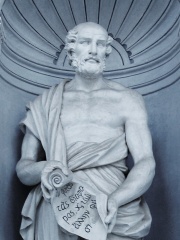
10. Theophrastus (371 BC - 287 BC)
With an HPI of 80.19, Theophrastus is the 10th most famous Greek Philosopher. His biography has been translated into 73 different languages.
Theophrastus (; Ancient Greek: Θεόφραστος, romanized: Theophrastos, lit. 'godly phrased'; c. 371 – c. 287 BC) was an ancient Greek philosopher and naturalist. A native of Eresos in Lesbos, he was Aristotle's close colleague and successor as head of the Lyceum, the Peripatetic school of philosophy in Athens. Theophrastus wrote numerous treatises across all areas of philosophy, working to support, improve, expand, and develop the Aristotelian system. He made significant contributions to various fields, including ethics, metaphysics, botany, and natural history. Often considered the "father of botany" for his groundbreaking works "Enquiry into Plants" (Ancient Greek: Περὶ φυτῶν ἱστορία, romanized: Peri phytōn historia) and "On the Causes of Plants", (Ancient Greek: Περὶ αἰτιῶν φυτικῶν, romanized: Peri aitiōn phytikōn) Theophrastus established the foundations of botanical science. His given name was Tyrtamos (Ancient Greek: Τύρταμος); the nickname Theophrastus ("divine speaker") was reputedly given to him by Aristotle in recognition of his eloquent style. He came to Athens at a young age and initially studied in Plato's school. After Plato's death, he attached himself to Aristotle who took to Theophrastus in his writings. When Aristotle fled Athens, Theophrastus took over as head of the Lyceum. Theophrastus presided over the Peripatetic school for thirty-six years, during which time the school flourished greatly. He is often considered the father of botany for his works on plants. After his death, the Athenians honoured him with a public funeral. His successor as head of the school was Strato of Lampsacus. The interests of Theophrastus were wide ranging, including biology, physics, ethics and metaphysics. His two surviving botanical works, Enquiry into Plants (Historia Plantarum) and On the Causes of Plants, were an important influence on Renaissance science. There are also surviving works On Moral Characters, On Sense Perception, and On Stones, as well as fragments on Physics and Metaphysics. In philosophy, he studied grammar and language and continued Aristotle's work on logic. He also viewed space as merely the arrangement and position of bodies, time as a byproduct of motion, and motion as an inevitable result of all activity. In ethics, he regarded happiness as depending on external influences as well as on virtue.
People
Pantheon has 66 people classified as Greek philosophers born between 690 BC and 1936. Of these 66, none of them are still alive today. The most famous deceased Greek philosophers include Aristotle, Plato, and Socrates.
Deceased Greek Philosophers
Go to all RankingsAristotle
384 BC - 321 BC
HPI: 96.25
Plato
427 BC - 347 BC
HPI: 95.94
Socrates
470 BC - 399 BC
HPI: 94.90
Pythagoras
570 BC - 495 BC
HPI: 93.36
Democritus
460 BC - 360 BC
HPI: 86.85
Epicurus
341 BC - 269 BC
HPI: 86.65
Plutarch
46 - 127
HPI: 83.51
Protagoras
486 BC - 420 BC
HPI: 83.37
Gorgias
483 BC - 375 BC
HPI: 80.90
Theophrastus
371 BC - 287 BC
HPI: 80.19
Apollodorus of Athens
180 BC - 110 BC
HPI: 78.45
Antisthenes
445 BC - 365 BC
HPI: 78.34
Overlapping Lives
Which Philosophers were alive at the same time? This visualization shows the lifespans of the 3 most globally memorable Philosophers since 1700.


